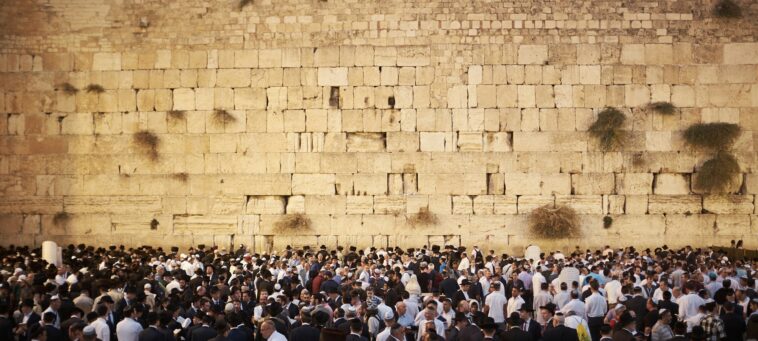- Israelis are a diverse population primarily comprising Jews and Arabs.
- Israeli culture is enriched by immigrants from Europe, Asia, Africa, and the Americas.
- Israel’s official languages are Hebrew and Arabic, with English widely spoken.
- The Israeli diaspora is significant, with notable communities in the United States, Russia, and Canada.
- Israel’s history, from ancient times to modern statehood, shapes its unique cultural and social fabric.
The Israeli Population: A Diverse Tapestry
Ethnic and Religious Composition
Israel, a country with a rich tapestry of cultures and ethnicities, is predominantly inhabited by Jews and Arabs. Jews constitute approximately 75% of the population, with Arabs accounting for about 20%. This diverse society also includes ethnic and religious minorities, making up the remaining 5%.
The Roots of Israeli Culture
Israel’s cultural landscape has been profoundly influenced by Jewish communities from the diaspora. Early immigrants from Europe, Western Asia, and North Africa laid the foundations of modern Israeli culture. Subsequent immigration waves, notably from Ethiopia, the former Soviet Union, and the Americas, have further diversified this cultural milieu.
Language and Communication
Hebrew, the primary language of Israel, functions as the government’s official medium. Arabic, spoken by the Arab minority, also holds an official status. English, a compulsory second language in schools, is widely spoken, facilitating global communication. Other languages like Russian, Yiddish, and French, echo Israel’s multicultural character.
Israeli Diaspora: Global Footprints
Israelis and their descendants have established a considerable diaspora. Notably, substantial communities exist in Russia, the United States, and Canada. This diaspora, encompassing various ethnic and religious groups, forms an integral part of Israel’s global identity.
Israel’s Demographic Dynamics
The Urban and Rural Divide
Israel’s urban centers, notably Tel Aviv, Jerusalem, and Haifa, are vibrant cultural hubs. The rural landscape, characterized by kibbutzim and moshavim, reflects a different aspect of Israeli life, emphasizing community living and agriculture.
Immigration and Emigration Patterns
Israel has experienced significant immigration, primarily under the Law of Return. Conversely, emigration has also been notable, with Israelis seeking opportunities abroad for various economic and political reasons.
The Israeli Tapestry: Ethnic and Religious Groups
Jewish Diversity
Israeli Jews are a mosaic of ethnic backgrounds including Ashkenazi, Mizrahi, Sephardic, Ethiopian, and others. This diversity is a testament to the global Jewish diaspora’s influence on Israel.
Arab Israelis
Arab Israelis, predominantly Sunni Muslims, with Christian and Druze minorities, form a significant part of the population. Concentrated in areas like the Galilee, Triangle, and Negev, they maintain distinct cultural and linguistic identities.
Other Groups
Israel’s societal fabric includes groups like the Bedouin, Druze, Maronites, Armenians, and others, each contributing uniquely to the country’s diversity.
Linguistic Landscape
The linguistic diversity in Israel mirrors its ethnic and cultural pluralism. The use of multiple languages in daily life illustrates the country’s multifaceted nature.
The Israeli Diaspora: A Global Phenomenon
American-Israelis
A significant number of Israelis, including their descendants, reside in the United States, forming the Israeli-American community.
Russian-Israelis
Moscow hosts the largest Israeli expatriate community, predominantly Russian-speaking, reflecting the historical ties between the two countries.
Canadian-Israelis
Israeli immigrants in Canada, along with their descendants, constitute the Israeli-Canadian community, adding to the multicultural fabric of Canada.
Israeli Nationality: A Legal Perspective
The 2013 Supreme Court ruling on nationality emphasizes the distinction between citizenship and ethnicity in Israel, underscoring the complexity of national identity in the Israeli context.
The Historical Context
From Ancient Israelites to Modern Israelis
The term “Israeli” encompasses the diverse citizens of modern Israel, contrasting with the historical “Israelite” identity. This distinction reflects the evolution from biblical times to the present state.
State Formation and Development
Israel’s journey from a biblical land to a modern state is marked by significant historical events, including the formation of the United Monarchy, the destruction of the northern Kingdom of Israel, and the subsequent establishment of the modern State of Israel in 1948.
Cultural Richness
Arts and Entertainment
Israel’s major cities are cultural hotspots, with an array of museums, music, and dance. The fusion of eastern and western influences creates a unique artistic landscape.
Religious Diversity
The religious composition of Israel is predominantly Jewish, with significant Muslim, Christian, and Druze communities, each adding to the country’s religious diversity.
Conclusion: Israel’s Multifaceted Identity
Israel’s identity is shaped by its diverse population, rich history, and cultural plurality. This vibrant mosaic is a testament to the country’s unique character in the global arena.
Frequently Asked Questions
- What are the main ethnic groups in Israel?
- Jews and Arabs are the primary ethnic groups, along with other minorities.
- What languages are spoken in Israel?
- Hebrew, Arabic, English, Russian, and several other languages.
- How significant is the Israeli diaspora?
- The diaspora is notable, with large communities in Russia, the USA, and Canada.
- What is the legal distinction between Israeli citizenship and nationality?
- The 2013 Supreme Court ruling emphasized the separation of citizenship from ethnicity or religion.
- How does Israel’s history influence its modern identity?
- Israel’s history, from biblical times to statehood, shapes its cultural and social identity.
- What is the proportion of Jews in Israel?
- Approximately 75% of the population.
- Are there non-Jewish Israeli citizens?
- Yes, including Arabs, Druze, Maronites, and other groups.
- What are the official languages of Israel?
- Hebrew and Arabic.
- What is the significance of the Law of Return in Israeli immigration?
- It allows Jews from around the world to immigrate and gain Israeli citizenship.
- How does Israel’s cultural landscape reflect its diversity?
- Through its varied music, art, religious practices, and languages.





